
French postcard by E.D.U.G., no. 459. Photo: Sam Lévin.
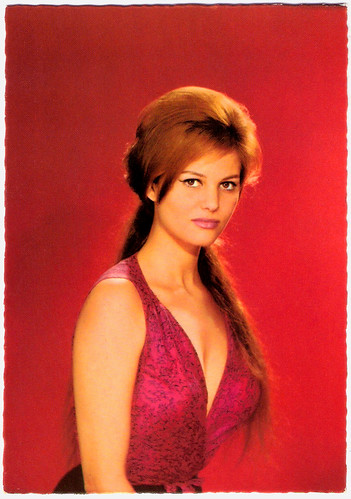
French postcard by E.D.U.G., no. 183. Photo: Sam Lévin.
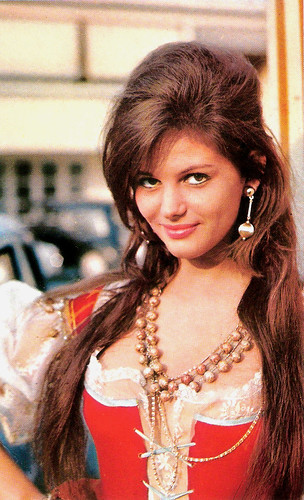
French postcard by Edition P.I., Paris, no. 1102. Photo: Kasparian. Publicity still for Cartouche (1962).

Spanish postcard by Ediciones Raker, Barcelona. no. 1094. Photo: Claudia Cardinale in The Pink Panther (Blake Edwards, 1963).
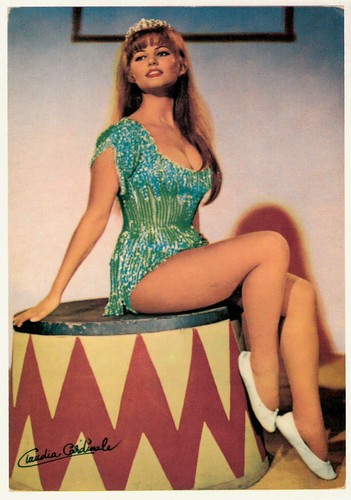
Postcard by Moviestar 1961, no. F 73. Photo: Publicity still for Circus World (1964).
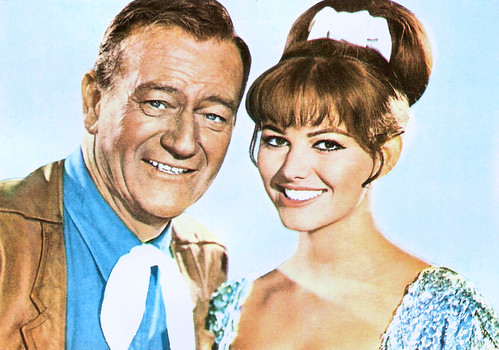
Romanian postcard by Casa Filmului Acin. Publicity still for Circus World (Henry Hathaway, 1964) with John Wayne.

Spanish postcard by Postal Oscar Color, no. 567. Holding an announcement for an award for Blindfold (Philip Dunne, 1966).
Pink Panther
In 1963, Claudia Cardinale played the princess who owned the Pink Panther diamond in The Pink Panther (Blake Edwards, 1963), which was filmed in Italy. It was the first in the series of detective comedies starring Peter Sellers as bumbling French Inspector Jacques Clouseau (the mishap-prone snoop was actually a supporting player in his debut).
The film was an enormous success and brought CC to English-speaking audiences. In 1964, she co-starred with John Wayne and Rita Hayworth in her first American production, Circus World (Henry Hathaway, 1964). It was another box-office hit.
The following year, she appeared with Rock Hudson in Blindfold (Philip Dunne, 1966), an offbeat mixture of espionage and slapstick comedy.
The Professionals (Richard Brooks, 1966) is her favourite among her Hollywood films. In this Western, she is a gutsy Mexican woman married against her will to a rich American. The film received Academy Award nominations for Best Direction (Richard Brooks), Best Screenplay (Brooks again), and Best Cinematography (Conrad L. Hall).
Claudia Cardinale continued dividing her time between Hollywood and Europe for the remainder of the decade.

Cover of Progress Film Programm, no. 16/61. Claudia Cardinale in Un maledetto imbroglio / The Facts of Murder (Pietro Germi, 1959), based on Carlo Emilio Gadda's novel 'Quer pasticciaccio brutto de via Merulana' (That Awful Mess on Via Merulana, 1957). Via Merulana is a major street in Rome. The German title of the film was: Was geschah in der Via Merulana?

Cover of Illustrierte Film-Bühne, no. 6442. Claudia Cardinale and Jean-Paul Belmondo during the shooting of La viaccia / The Lovemakers (Mauro Bolognini, 1961). Belmondo wears his outfit from this period film, set in the 1880s. Cardinale wears her modern clothes. The German title of the film was Das Haus in der Via Roma.

Cover Progress Film Programm, no. 109/65. Claudia Cardinale in La ragazza di Bube / Bebo's Girl (Luigi Comencini, 1963). The German title was Bubes Mädchen.
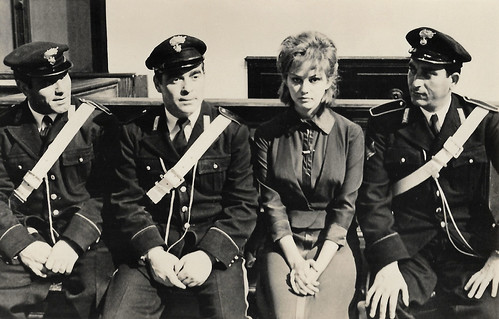
Small Czech collector card by Pressfoto, Praha (Prague), 1965, no. S 101/7. The retail price was Kcs 0,50. Photo: Claudia Cardinale in La ragazza di Bube / Bebo's Girl (Luigi Comencini, 1963). The film was presented at the Karlovy Vary International Film Festival in 1964.

Spanish postcard by Productos Compactos, no. 44526, 1990. Claudia Cardinale and David Niven on a publicity still for The Pink Panther (Blake Edwards, 1963).

West German by Filmbilder-Vertrieb Ernst Freihoff, Essen, no. 890. Photo: Lothar Winkler. Claudia Cardinale in Circus World (Henry Hathaway, 1964).

West German postcard by Kolibri / Friedrich W. Sander Verlag, Minden/Westf, no. 2367. Photo: Schorcht. Claudia Cardinale in Il magnifico cornuto / The Magnificent Cuckold (Antonio Pietrangeli, 1964).
The ultimate Spaghetti Western
Throughout the 1960s, Claudia Cardinale also appeared in some of the best European films. In France, she appeared in the Swashbuckler Cartouche (Philippe de Broca, 1962), featuring Jean-Paul Belmondo.
Back in Italy, she played in I Giorno della civetta / The Day of the Owl (Damiano Damiani, 1968) with Franco Nero, and Nell'anno del Signore / The Conspirators (Luigi Magni, 1969) with Nino Manfredi.
Mesmerising is her performance in Sandra / Vaghe stelle dell'Orsa... (Luchino Visconti, 1965) as a Holocaust survivor with an incestuous relationship with her brother (Jean Sorel).
Another highlight in her career is C'era una volta il West / Once Upon a Time in the West (Sergio Leone, 1968), the ultimate Spaghetti Western. Lucia Bozzola writes in her review at AllMovie: "In Sergio Leone's epic Western, shot partly in Monument Valley, a revenge story becomes an epic contemplation of the Western past. (...)
As in his 'Dollars' trilogy, Leone transforms the standard Western plot through the visual impact of widescreen landscapes and the figures therein. At its full length, Once Upon a Time in the West is Leone's operatic masterwork, worthy of its legend-making title."

Vintage still. Claudia Cardinale, Michael Craig and Jean Sorel in Vaghe stelle dell'Orsa / Sandra (Luchino Visconti, 1965).
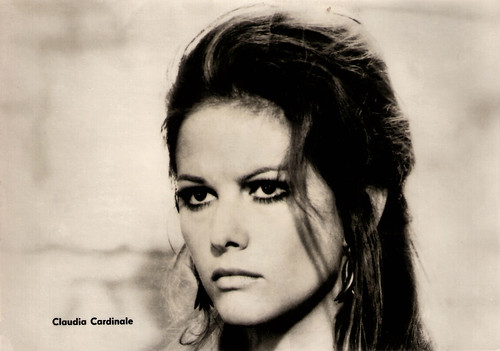
East German postcard by VEB Progress Filmvertrieb, Berlin, no. 225/69, 1969. Photo: publicity still for Il giorno della civetta / The Day of the Owl (Damiano Damiani, 1968).
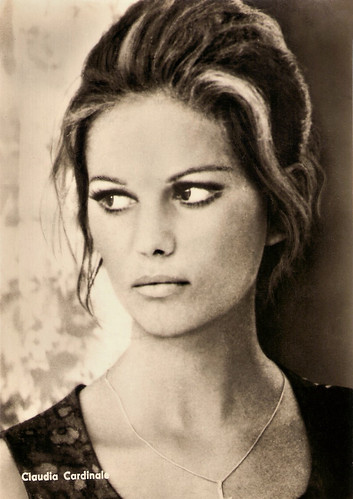
East German postcard by VEB Progress Filmvertrieb, Berlin, no. 20/70, 1970. Photo: publicity still for Il giorno della civetta / The Day of the Owl (Damiano Damiani, 1968).
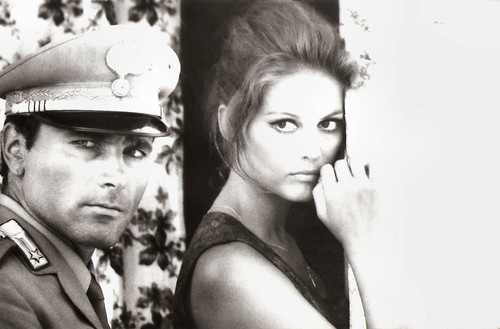
Romanian postcard by Casa Filmului Acin, no. 427. Photo: publicity still for Il giorno della civetta / The Day of the Owl (Damiano Damiani, 1968) with Franco Nero.
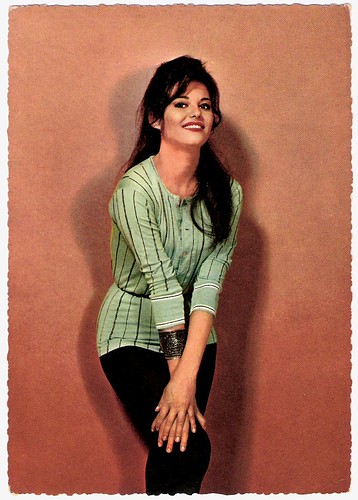
German postcard by Krüger, no. 902/47.
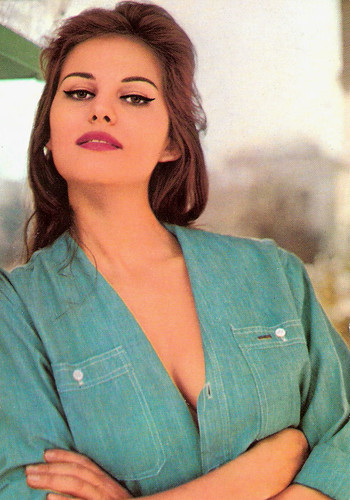
German postcard by Krüger, no. 902/115.

Spanish postcard by Postal Oscarcolor, no. 343. With Alain Delon.
International arthouse hit
In the following decades, Claudia Cardinale remained mainly active in European cinema. She played a small part for Visconti in Gruppo di famiglia in un interno / Conversation Piece (Luchino Visconti, 1974) starring Burt Lancaster and Silvana Mangano.
She worked with other major Italian directors at Goodbye e amen (Damiano Damiani, 1977), the TV mini-series Jesus of Nazareth (Franco Zeffirelli, 1977) as the adulteress, and La Pelle / The Skin (Liliana Cavani, 1981) starring Marcello Mastroianni and based on the bitter novel by Curzio Malaparte concerning the Allied liberation of Naples.
An international arthouse hit was Fitzcarraldo (Werner Herzog, 1982), the story of an obsessed impresario (Klaus Kinski) whose foremost desire in life is to bring both Enrico Caruso and an opera house to the deepest jungles of South America. In his diary of the making of Fitzcarraldo, Werner Herzog writes: "Claudia Cardinale is a great help because she is such a good sport, a real trouper, and has a special radiance before the camera. In her presence, [Klaus Kinski] usually acts like a gentleman."
Other interesting films include the Luigi Pirandello adaptation Enrico IV / Henry IV (Marco Bellocchio, 1984) with Marcello Mastroianni, the epic La révolution française / The French Revolution (Robert Enrico, Richard T. Heffron, 1989), the nostalgic drama Mayrig / Mother (Henri Verneuil, 1991), and the romantic thriller And now... Ladies and Gentlemen (Claude Lelouch, 2002) starring Jeremy Irons.
On Television, she gave another well-received performance in the TV drama La storia / History (Luigi Comencini, 1986), in which she plays a widow raising a son during World War II.

French postcard by E.D.U.G., no. 229. Photo: Sam Lévin.

German postcard in the Kolibri Foto-Karte series by Friedrich W. Sander-Verlag, Minden-Westf., no. 2515. Photo: Universal International. Publicity still for The Hell with Heroes (Joseph Sargent, 1968). Collection: Daniël van der Aa.
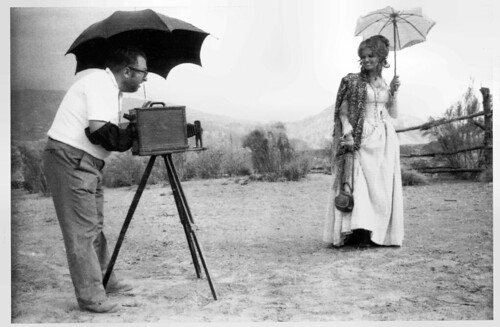
Italian postcard by Cineteca Bologna for the exhibition Un Altro West (2008). Photo: A. Novi. Sergio Leone and Claudia Cardinale on the set of C'era una volta il West / Once Upon a Time in the West (Sergio Leone, 1968).
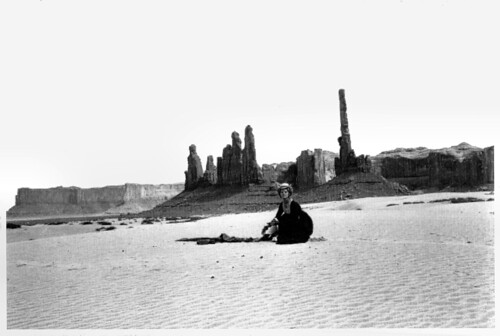
Italian postcard by Cineteca Bologna, 2007. Photo: A. Novi / Cineteca di Bologna. Claudia Cardinale in C'era una volta il West / Once Upon a Time in the West (Sergio Leone, 1968).

Italian postcard by Cineteca Bologna, 2007. Photo: A. Novi / Cineteca di Bologna. Claudia Cardinale in C'era una volta il West / Once Upon a Time in the West (Sergio Leone, 1968).
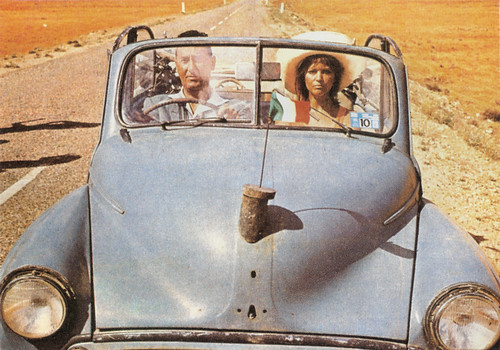
Italian postcard by Gruppo Editoriale Lo Vecchio, Genova, in the Alberto Sordi series. Photo: publicity still for Bello, onesto, emigrato in Australia sposerebbe compaesana illibata / A Girl in Australia (Luigi Zampa, 1971) with Alberto Sordi.
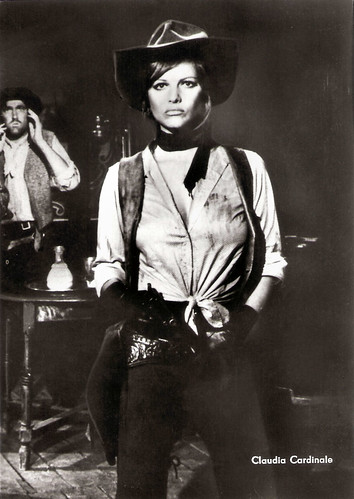
East German postcard by VEB Progress Filmvertrieb, Berlin, no. 154/73. Publicity still for Les pétroleuses / Frenchie King (Christian-Jaque, 1971). The billing of BB vs. CC in this Western didn't live up to expectations.
Strong political convictions
Claudia Cardinale was a liberal with strong political convictions. She was involved in many humanitarian causes, and pro-women and pro-gay issues, and she has frequently stated her pride in her Tunisian and Arab roots - as evidenced by her appearance as herself in the Tunisian film Un été à La Goulette / A Summer at La Goulette (Férid Boughedir, 1996).
She managed to combine her acting work with the role of goodwill ambassador for UNICEF and advocate for the work of Luchino Visconti, with whom she made four films.
She wrote an autobiography, 'Moi Claudia, Toi Claudia' (Me Claudia, You Claudia). In 2005, she also published a French-language book, 'Mes Etoiles' (My Stars), about her personal and professional relationships with many of her directors and co-stars through her over 50 years in show business.
In 2002, she won an honorary Golden Bear award of the Berlin Film Festival, and previously in 1993, she was awarded an honorary Golden Lion at the Venice Film Festival.
Cardinale worked steadily on and in more recent years, she also worked in the theatre. In the cinema, she appeared in the French-Tunisian gay drama Le fil / The String (Mehdi Ben Attia, 2009), the Algerian drama Un balcon sur la mer / A View of Love (Nicole Garcia, 2010), in which she played the mother of Jean Dujardin, and the costume drama Effie Gray (Richard Laxton, 2014) with Dakota Fanning. Claudia Cardinale has made over 135 films since 1956.
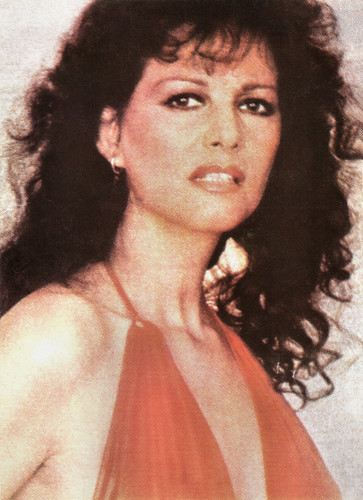
Romanian postcard by Casa Filmului Acin.

Romanian postcard by Casa Filmului Acin.

Romanian postcard by Casa Filmului Acin, no. 278.

Romanian postcard by Casa Filmului Acin. Claudia Cardinale and daughter Claudia Squitieri.

French poster postcard by Eds. F. Nugeron. Design: Yves Prince. Affiche for La Storia (Luigi Comencini, 1986), based on the novel (1974) by Elsa Morante, and starring Claudia Cardinale.
Trailer for Fitzcarraldo (1982). Source: Film Society of Lincoln Center (YouTube).
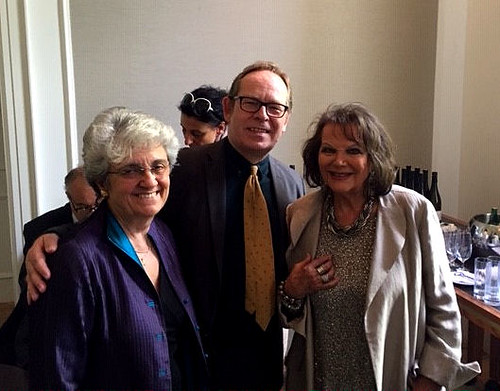
Claudia Cardinale in 2019, with Caterina D'Amico, producer and former president of the Scuola Nazionale del Cinema (Centro Sperimentale di Cinematografia) in Rome, and EFSP's Ivo Blom at the Waldorf Astoria Hotel in Amsterdam.
Sources: Lucia Bozzola (AllMovie - Post now defunct), Steve Rose (The Guardian), IMDb and Wikipedia.
1 comment:
las petroleras, 1971
Post a Comment